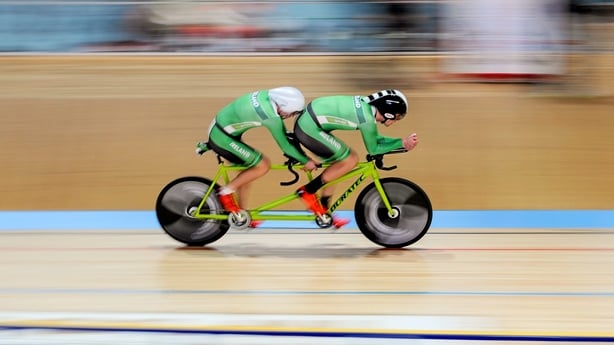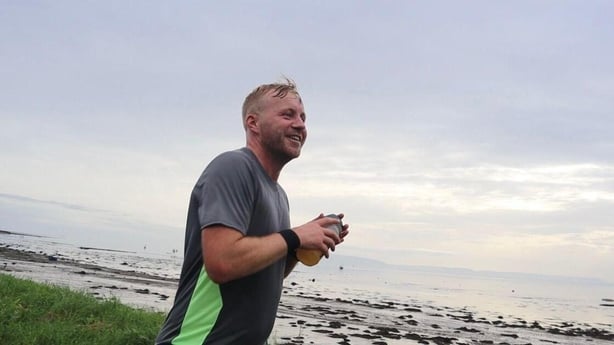"We can do anything. It just takes longer."
Peter Ryan has a succinct synopsis of what it means to be visually impaired.
The Tipperary man lives with Leber's Hereditary Optic Neuropathy, a rare genetic condition that struck without warning when he was 19.
His vision was reduced by almost 90%, most that remained peripheral, and his journey took a whole new path.
What immediately followed was destruction, intervention, acceptance and determination.
Slowly he rebuilt his life with different blocks, returning to sport, representing his country as a para cyclist at the Paralympic Games and undertaking mammoth challenges to both help others with sight loss or impairment, but also to prove to himself there is no ceiling.
"There was a time when I was a bitter young man. The list of things I couldn’t do was big, but now I’d be of the mindset that I can do anything bar drive," he tells RTÉ Sport.
Ryan will be part of RTÉ’s upcoming Paralympic coverage, and is acutely aware of the highs and lows for athletes during the four-year cycle between Games.
His own journey began during the post-Olympic glow of London 2012, but rather than events at the English capital, it was 28 days in the Aiséirí Centre in Cahir – an addiction treatment centre - that shaped his journey to Rio four years later.
In 2012, Ryan was struggling to come to terms with his diagnosis.
A talented underage hurler with Upperchurch-Drombane, his life was being pulled and dragged in ways he could never have imagined.
"That was such a difficult time in my life, trying to figure out who I now was, and what my future held"
Rock bottom came when his family implored him to get help and part of that was to address his spiralling alcohol abuse. Looking back now, he can appreciate the Rio dream effectively began in month-long stay at a treatment centre.
"That was such a difficult time in my life, trying to figure out who I now was, and what my future held," he tells RTÉ Sport.
The void that sport - as he knew it back then - left was a chasm. Retrospectively, it should have been no-brainer to throw himself into para sports. If only it were that easy.
"I didn’t identify with that world," he says. "I needed to drop my hang-ups. Basically, I was shedding who I was."
A para open day in UCD broadened the horizons. Ryan spoke to everyone, which included a group from para cycling.
While he wasn’t fit, his numbers from the stationary watt-bike gave them something to work with. His burning desire to compete again sealed the deal.
Seven months after first sitting on a bike in the winter of 2012 he was a national champion, with Damien Shaw as his pilot.
Still learning his trade, Ryan and Shaw were going from strength to strength before he found a new partner in Seán Hahessy, a national junior and U-23 champion.
In 2015 they placed eighth at the world championships and soon booked a place in Rio.

"It's such a unique relationship," Ryan explains of tandem cycling. "You have full trust in your pilot. You can read speeds of more than 100km/h downhill. The faith we have in each other is crucial, but the bond is deep. Without him, I’m not competing.
"And it’s not just on the bike. At training camps, at competitions, that person is still your eyes. Nearly every moment not asleep is with your pilot. It’s a bond like no other.
"People often think that pilots are there just to help you, doing a good deed. And they are. But they are also competitive animals. They are there as they want to win and I love that. It ensures that I must always do my best on the bike.
"It’s easier to fight for someone else in life than for yourself."
Rio was an experience like no other, and while he thought the time-trial and road race could have gone better, it felt at the time that it was the perfect learning experience for Tokyo in four years.
That plan, like many previous ones earlier in his life, was turned on its head.
Hahessy pushed out joining the gardaí for a year to give the Games one serious push, but Covid ensured it would be 2021 at the earliest, and even that was shrouded in doubt.
He couldn’t put his career on hold any longer amid such uncertainty, while Ryan’s motivation to start again with a new pilot and immerse himself fully into the challenge simply wasn’t there.
"I just couldn’t do it. I didn’t even watch the races as I had checked out."
There is no such issue this time around. He will be working with RTÉ as an analyst during the Paralympics and it has rejuvenated his passion for the sport.
"I know the Irish guys involved, and I know a lot of the guys they will be competing against. Some people have asked me how can I call events that I can’t see, but it’s more about offering my perspective from the perspective of a cyclist, outlining strategies and explaining some of the more technical aspects of the sport."
The Paralympic slogan – spirit in motion – sums up Ryan rather well.
In 2018, he became the first Paralympic athlete to complete the gruelling Race Around Ireland (2,252km) in just 122 hours.

Even that feat almost paled into insignificance last October when he ran from Malin to Mizen Head, clocking 586km – three marathons a day – concluding the mammoth challenge on World Sight Day.
Ryan has appeared on radio and TV on the back of those accomplishments – he was on the latest season of the Tommy Tiernan Show – and while he is now comfortable in sharing his story, the main motivation is a selfless one. Perhaps there is someone out there who can take something from his journey.
"When I first received the news on my condition, I had no idea that the world of sport was still open to me," he says.
"There was a grieving period. If someone had told me back then that I would cycle and run around the country, I would represent my country on the global stage and find fulfilment outside of sport as well as in it, I wouldn’t have believed it.
"At the start, I didn't know how to be visually impaired or blind. I wasn't secure or confident in myself, I suppose. You're carrying this thing that in your head, it's your biggest insecurity. You think it devalues your offering.
"We're asking people to just get in behind it and see what happens"
"I think anyone in a similar situation now to what I went through then would have more role models, greater awareness of what can be achieved."
Working as an analyst may not be a physical challenge like competing at the Games or ultra-distance running, but once again, it will take him firmly out of his comfort zone.
What are his hopes for the Games?
"It’s throwing a light on sports that we’re not looking at all year round," he says.
"And there’s that extra piece of, like say the disability story – the backdrop - what it means to parents. We’re asking people to just get in behind it and see what happens."
The 2024 Paralympic Games takes place from 28 August - 8 September. Follow all the action from Paris with our coverage on RTÉ.ie/sport and the RTÉ News app, watch live on RTÉ2 and the RTÉ Player or listen to updates and live commentaries on RTÉ Radio



